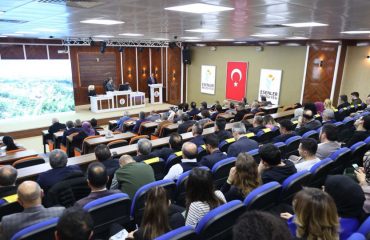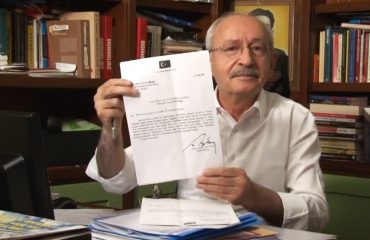

People who are not Iran watchers often get confused when Iranian soldiers are mentioned. In Iran, there are two armies. The first one is the “conventional” one, the Artesh. There is also Sepah Pasdaran, or the Revolutionary Guards (IRGC). It was established by Ayatollah Ruhollah Khomeini, who did not trust the army from the time of the Shah and wanted to create a force solely dedicated to the defense of Iran’s political system. The IRGC are the favorites of the regime. Money flows to them, and their authority does not end at the national borders. Usually backed by hefty financial support, IRGC often tries to carry out operations abroad.
Mehrdad Abdarbashi was an Iranian soldier, a helicopter pilot at Artesh. Later on, he told a dissident journalist that the government wanted to send him to the civil war in Syria, Abdarbashi did not want to go and then fled to Turkey.
A counterintelligence operation
Abdarbashi came to the attention of the Turkish public through footage of a Turkish counterintelligence operation in the city of Van, bordering Iran. According to the semi-official Anadolu Agency that broadcasted the video, two Iranian secret agents who were about to smuggle the Iranian ex-soldier, now-a-dissident, Abdarbashi to Iran were intercepted and apprehended by Turkish security forces. The image served was so detailed that even the faces of the security guards who tried to carry out the operation were visible. Reportedly, the incident took place about 20 days before the video was released. The publishing of the footage also coincided with the escalation of border tensions between Azerbaijan and Iran. It is hard to believe this was a coincidence.
Abdarbashi gave a short interview after the video created a minor media earthquake. The journalist who interviewed him has been known as very critical of the regime in Iran. In the interview, Abdarbashi praised the Turkish National Intelligence Organization (MIT) and talked about the previous kidnapping attempts against him. According to him, in one of these instances, agents of Iran tried to kidnap him by using a Persian translator working in the immigration administration in Turkey.
Too many coincidences
The abductions of Iran citizens from Turkey’s soil are not a particularly new occurrence to the Turkish public. Only one year ago, Habib Chaab, a political activist, was kidnapped from Turkey by the Iranian secret service. Chaab was kidnapped with the help of the Kurdish crime syndicate leader Zindaşti and Chaab’s ex-wife. In his interview, Abdarbashi shared a similar detail. Abdarbashi talked about a woman whom he met and who quickly became close to him. But unlike Chaab, Abdarbashi did not fall into these traps. He kept in touch with the MIT, which ultimately helped thwart the abduction attempts.
As a result of the unsuccessful kidnapping of Abdarbashi, Turkey detained eight individuals for alleged participation in the plot. According to the information given by their lawyers, only one of those detainees was an Iran citizen.
An illiterate Kurdish peasant
In other media, the event was reported differently. BBC Persian reported on one of the detainees, Solheddin Selmanpour, who was implicated in the alleged abduction attempt. Apparently, Selmanpour is a functionally illiterate Kurdish villager living in the Iranian town of Hoy, very close to the Turkish border. Selmanour’s brother, interviewed by BBC Persian, said that on the day of the incident, Solheddin traveled to Van for shopping and was arrested by mistake. The brother added that Sollheddin does not work for the Iranian government and is a simple farmer with a small life.
I spoke to Selmanpour’s lawyer, Rojhat Levent Özgökçe. Özgökçe says that her client got in a taxi on the evening of the incident. The taxi driver told Selmanpour that they would pick up another person and continue their way, and that, without realizing what had really happened, Selmanpour was arrested by the police. According to the lawyer, the only material evidence which was found in the taxi was duct tape.
A deception operation?
Mesopotamia News Agency published that the suspects were detained for 9 days on charges of providing information to the alleged kidnappers. They were sent to Van High-Security Prison, and a confidentiality order was placed on the file. The duct tape found in the trunk of the vehicle was shown as the only evidence for the arrested who were also accused of networking with a budget of $30,000.
According to his relatives and his lawyer, Selmanpour came to Van to buy stationery and school supplies for his children. Reportedly, he even bought himself a second-hand pair of shoes with the last money left in his pocket. From this point of view, either Selmanpour is just a poor, simple man, caught in the middle of the events, or the event itself carries a very suspicious connotation. According to some Iranian media, Turkey’s operation was staged.
Before jumping to conclusions, it is useful to remember some of Iran’s famous operations that emerged recently.
For example, not that long ago, Iran’s secret service contracted with a Mexican cartel to assassinate the US Ambassador to Saudi Arabia. In other words, the Iranian regime has been known as a sponsor of many proxy groups and a contractor of different criminal enterprises to attain its goals. Selmanpour may indeed be one of the thousands of Iranians going shopping from Iran to Turkey.
However, if one wanted to play devil’s advocate in this case, it should be taken into account that the Iran rial is worthed even less than the struggling Turkish lira, so Turkey is not that cheap for Iranians. Would an illiterate villager from Iran come to Turkey for shopping with his last money in his pocket? Possibly, but maybe not so probably.
Reciprocal messages over covert ops
One thing is for certain: in the wider context of relations between the two countries, this incident again serves as a reminder that Turkey and Iran have been increasing the warning messages they have been sending to each other.
Recently, Turkey has apparently become a place where all kinds of oppressive regimes try to put pressure or even kill their dissidents via covert operations. Turkey probably wants to put an end to this now. In the context of the Iranian regime, the recent tensions with Azerbaijan certainly pushed Turkey to take a harder stance on IRGC’s activities on its soil.
Iran has been carrying out covert operations in foreign countries partly to give a message in domestic politics. Many wealthy people have recently fled from Iran to Turkey, taking a lot of their wealth with them. This is a situation that makes Tehran very uncomfortable in the context of the country’s failing economy. The message of the regime’s foreign covert operations is that nobody who betrays the regime will ever be safe anywhere.
Take your hands off
Detailed reports of the incident in Van were not really accessible in the official Iran media, but only in places such as BBC Persian or independent social media accounts. The regime obviously does not want to magnify this event as it ultimately ended in failure. Iranians tend to portray this as a fake construct of the Turkish side.
Regardless of the full truth, it is obvious that Turkish security forces decided to protect another dissident in Turkey, sending a clear message that the Iranian operations on Turkey’s soil will be monitored and if need be, swiftly curbed. Like everything in this part of the world, no individual incident between different national security agencies could be observed as an isolated event. It should always entail a wider context and assume possible new heating up in the regional relations.


